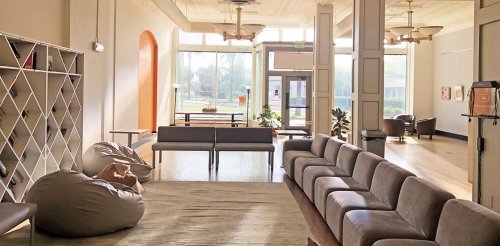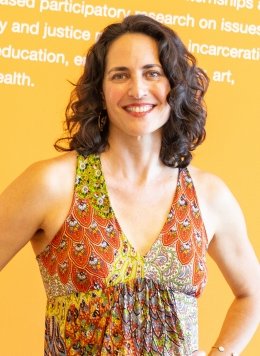The CASA Pitzer Community Center

Our Space
CASA Pitzer is housed in the heart of downtown Ontario, California in the historic Frankish building, overseen by the San Bernardino Housing department, with specific use for low-income residents of Ontario. CASA takes over the first floor and basement of this space, with high ceilings and a lot of light.
The space is open to all of our community partners and organizations within the Inland Empire, at no cost as long as there is a community benefit or social justice-oriented goal behind the event, for any and all programming such as:
- Informational Forums
- Meetings
- Focus Groups
- Retreats
- Cultural Performances
- Social Justice Organizing
- Movie Nights
- Art Workshops
- Education
- Office Space
- Theatrical Performances
- Community-based Participatory Research Labs
Space Usage
Our space is equipped with a smart television, projector, charging station, tables, chairs, etc.
CASA furniture is also easily movable so you can organize the space to fit your organization’s specific needs.
Reservations
If you are interested in using the CASA space, please submit a reservation request: CASA Pitzer Space Reservation Form.
To view space availability, please check our CASA Reservation Calendar
COVID Protocols
- Users of this space must indicate to CASA program staff if they have any symptoms and/or believe they’ve had exposure to COVID at any point and immediately get tested.
- Should you have symptoms or be exposed, you must quarantine and not use the space.
- CASA provides free masks, hand sanitizer, and disinfectant wipes. You must use these in the space to clean and disinfect before and after each use.
Using the CASA Community Center
House Rules
- Keep the space clean & clean up after yourself.
- Turn off all lights and AC before leaving.
- No loud music unless previously agreed upon.
- Do not leave food out after event/space usage.
- Help protect the hardwood floors by picking up chairs, tables, etc. Do not slide objects across the floor.
- Do not use water or soap on wood floor.
- No alcohol is allowed in the CASA space.
- Do not park in back parking lot. Park on the street or in the lot to your left off Transit (Facing East) or on Emporia, Palm and Laurel where there is plenty of parking.
- No events may take place after 9 pm but cleanup can happen between 9-9:30 pm, if quiet.
- Please socialize in the front exterior of the building as opposed to the rear.
- Please use the dumpster in the back parking lot to dispose of trash. Trash should be emptied upon leaving the space.
- The dumpster key is located on the hanging ring in both restrooms.
- Please make sure to follow our COVID guidelines, and be aware that they are subject to change.
CASA Care
If you use CASA on a regular basis, please participate in its cleaning and care. When event or programming has ended please ensure that all of these issues have been attended to:
Cleaning tasks
*We ask all users of the space to please clean the space after events. If there is food trash please take it out to the outdoor bin. This is a community space and we want to ensure that it is not left with trash*
- Take out trash, Recyclables, Food waste:
- Open bins in the back parking lot with the key from the bathroom cabinet. The key reads “MI USA”
- Take out any food waste before you leave in the appropriate outdoor bin.
- Refill bathroom dispensers if supplies look low (toilet paper, toilet, seat covers and paper towels)
- Sweep space regularly and clean up any spills on the wood floors, followed by the use of
Meyers cleanser so that wood floors aren’t stained - Sanitize surfaces with wipes before and after use
- All trash cans are near the back doors; please dispense appropriately into the bins labeled as: trash, recycling and food waste
- Plates/cups/utensils, snacks, beverages and more kitchen supplies are available in the kitchenette drawers against the green wall
- Toilet paper, paper towels, soap and all other cleaning supplies or first aid are available in the large cabinets in the restrooms and at the top of the stairs above the basement
- Keychain on hook inside cabinet of first bathroom: gold key that reads “C068 USA” is for the locked items in the bathrooms (toilet paper, sanitary waste, toilet seat covers, and paper towel dispenser) the gold key that reads “MI USA” is for the trash bins outside.
Storage
- All trash cans are near the back doors; please dispense appropriately into the bins labeled as: trash, recycling and food waste
- Plates/cups/utensils, snacks, beverages and more kitchen supplies are available in the kitchenette drawers against the green wall
- Toilet paper, paper towels, soap and all other cleaning supplies for first aid are available in the large cabinets in the restrooms and at the top of the stairs above the basement
- Keychain on hook inside cabinet of first bathroom: gold key that reads "C068 USA" is for the locket items in the bathrooms (toilet paper, sanitary waste, toilet seat covers, and paper towel dispenser) the gold key that reads "MI USA" is for the trash bins outside.
General CASA Care
- Turn off all lights and AC before leaving.
- If you unlock the door, please lock the front door as well
- There is a box in the front that says CASA and there is a black allen wrench. This wrench is then put in the door to the right where there is a small hole. Twist the wrench and when the bar is pushed out, the door is locked. If the bar is pushed in, the door is unlocked.
- Help protect the hardwood floors by picking up chairs, tables, etc. Do not slide objects across the floor.
- Do not use water or soap on the wood floor.
- Do not park in the back parking lot. Park on the street or in the lot to your left off Transit (Facing East) or on Emporia, Palm and Laurel where there is plenty of parking.
- Have fun and continue changing the world!
COVID-19 precautions
Face coverings are currently not required on campus for vaccinated individuals, but feel free to mask up as you feel comfortable. For best protection for yourself and others, we recommend a 3-ply medical grade surgical, KN95, or N95 mask. We have masks available should you need one.
Group Agreements – Principled Struggle
We struggle for the sake of deepening our collective understanding
and getting to greater unity. To do this, we must each commit to:
- Being honest and direct while holding compassion.
- Have side conversations/one-on-ones to help us get better & build us up.
- Be responsible for our own feelings and actions.
- Seek deeper understanding. (We ask and read first)
- Consider that this may not be the container to hold what you need to bring.
- Be willing to be transformed in the service of the work!
Group Agreements – Principled Struggle
To learn, and to grow, is to struggle. Struggle is a condition for change and liberation. We’ve learned from our elders that to disagree and grapple with each other is an inevitable and necessary part of racial equity work and how we will ultimately get free.
We must strive to engage in Principled Struggle, (attributed to NTanya Lee), and work to foster and cultivate spaces to move through conflict in a way that makes us better. We struggle for the sake of deepening our collective understanding and getting to greater unity.
Principled Struggle
N’Tanya1 Lee of Left Roots broke this term down in a way that felt like a light bulb coming on in a dark room. She said that in struggle that is principled, we struggle for the sake of building deeper unity, that we are honest and direct while holding compassion, that we each take responsibility for our own feelings and actions, and seek deeper understanding by asking questions and reading a text (such as an article or proposal) before we launch our counter-argument. She also spoke to the reality that we must always consider that this meeting may or may not be the container to hold what we need to bring. A coalition meeting may not feel like a political home, a strategy table may not be the space to work through interpersonal dynamics. It might! But it’ s worth asking ourselves, what is the right space and who are the right people for this concern?
This way of understanding principled struggle works as an attention-focusing device. We live in a nation that is both pro-war and conflict-avoidant. It’s hard to learn how to be in righteous disagreement without either repressing our differences or trying to destroy each other. But principled struggle offers us another way, a way to struggle in which we are not being conflict avoidant, or conflict aggressive, but rather engaging in generative conflict, conflict that grows each of us and that creates more possibilities for what we can do in the world together. When we put our attention on conflict and difference in this way, it allows us to grow our capacity to be in integrity and unity with each other.
Brown, Adrienne Maree, et al. “A Call to Attention Liberation: To Build Abundant Justice, Let’s Focus on What Matters.” Truthout, Truthout, 24 Oct. 2018, truthout.org/articles/a-call-to-attention liberation-to-build-abundant-justice-let-s-focus-on-what-matters.
Meet Our Staff

Tessa Hicks Peterson
- Director of Critical Action+ Social Advocacy (CASA)
- Assistant Vice President, Community Engagement
- Professor of Urban Studies
Jenessa Flores Parker
- Assistant Director of Critical Action + Social Advocacy (CASA)

Paula Venegas Alvarez
- CASA Administrative Assistant